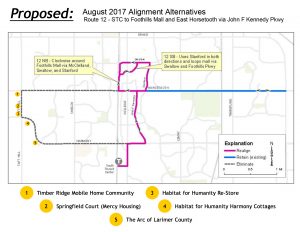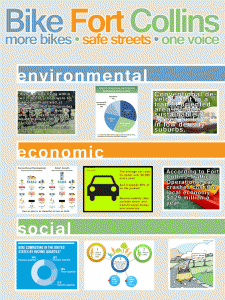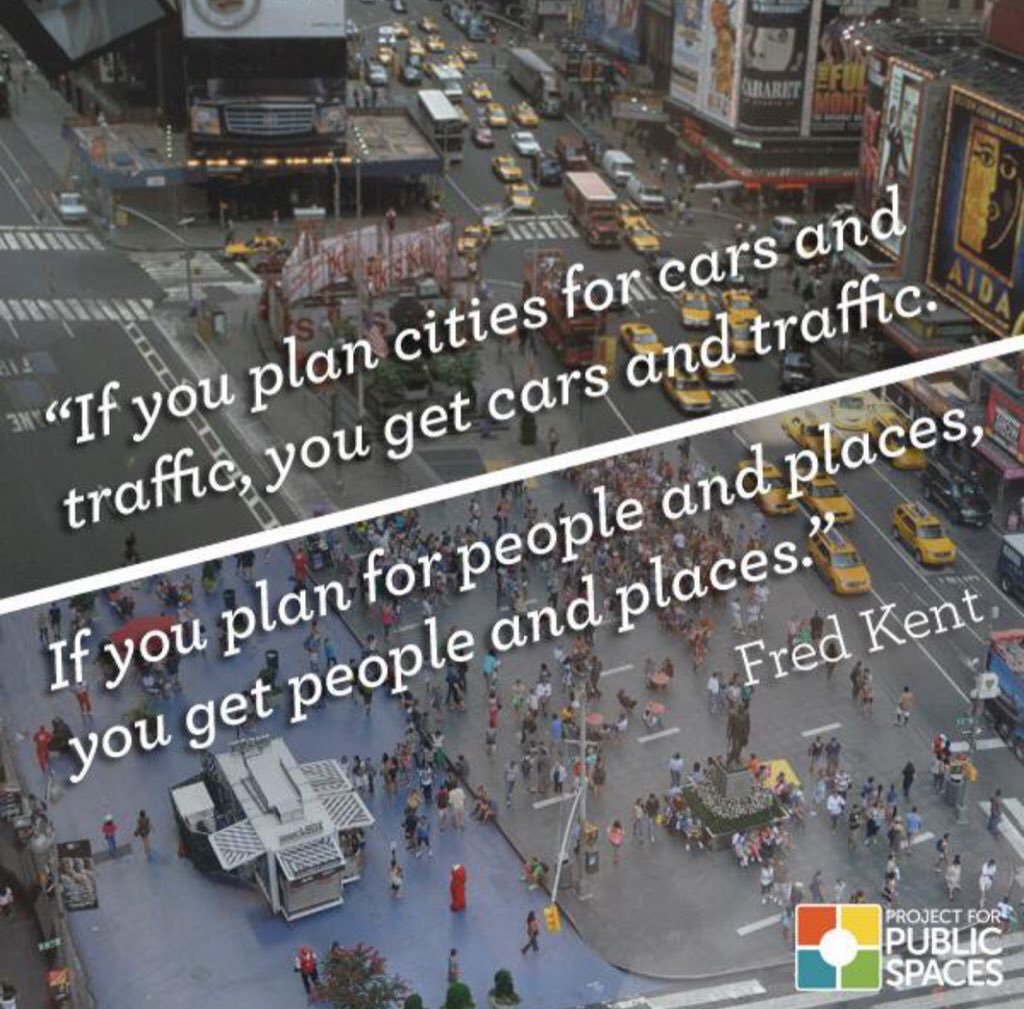
Tonight at the city’s regular council meeting at city hall (6:00PM) [note: council voted 6-1 to support the most robust Sunday service option, the route realignment concerns below remain], Fort Collins city council will consider the next step in fulfilling a commitment it made during the last budget process. They are due some credit for this step. Finally, it seems, we will join the vast majority of healthy, vibrant mid-sized peer cities in offering some Sunday bus service. We are fond of touting our commitment to triple bottom line sustainability- centering on policies that balance and advance social, environmental, and economic health and justice. But our inaction on prioritizing sustainable transportation makes us a regressive outlier.
 To whit, even as the city advances Sunday service, they are also considering a route realignment that would eliminate public transit in southwest Fort Collins. This would cut off the ARC, Habitat for Humanity’s Re-Store and planned Habitat Development Cottages on Harmony, Mercy Housing and Timber Ridge Mobile Home Park and more. If you’re troubled by that, as we are, join us in sending a message to city leaders that we can’t just rob Peter to pay Paul and call it progress. We won’t reach a meaningful, useful transit service by shuffling around the same marginal budget from route to route. Fort Collins must invest in transit and in people if we want to become the leader in social environmental and social sustainability we aspire to be.
To whit, even as the city advances Sunday service, they are also considering a route realignment that would eliminate public transit in southwest Fort Collins. This would cut off the ARC, Habitat for Humanity’s Re-Store and planned Habitat Development Cottages on Harmony, Mercy Housing and Timber Ridge Mobile Home Park and more. If you’re troubled by that, as we are, join us in sending a message to city leaders that we can’t just rob Peter to pay Paul and call it progress. We won’t reach a meaningful, useful transit service by shuffling around the same marginal budget from route to route. Fort Collins must invest in transit and in people if we want to become the leader in social environmental and social sustainability we aspire to be.
1) the most effective and cost effective way for cities to lead on climate change is transportation and land use policy that promotes transit and transit oriented development. Support Option 4 for the most robust possible commitment to transit service.
2) Do not cut service that affects already underserved communities. ridership volume is an incomplete, unjust metric for transit service. Economically marginalized and disabled folks need transit that WORKS! this means increasing frequency, service hours and days, and quality of infrastructure at and near busstops.
 Questions to email city leaders about our transportation budget:
Questions to email city leaders about our transportation budget:
Is our transportation budget fair and just?
Does it prioritize the safety and mobility and access of all of our community, irrespective of age, ability, gender, neighborhood, income level?
Is our transportation budget environmentally responsible?
Does it prioritize mode shift towards healthy, active transportation choices and development that supports biking, walking and transit?
Is our transportation budget economically responsible?
Who pays for the widening and construction of roads? the vast swaths of public and private space dedicated to car storage? the health impact of crashes, sedentary lifestyles, and pollution? the tax revenue lost to sprawl and a workforce that can’t afford to live in Fort Collins which either takes its dollars to surrounding bedroom towns, or spends too much on rent and lacks discretionary income?
write cityleaders@fcgov.com by the end of this week, or join us in commenting Tuesday, June 6th at City Hall.
 I’ll close by resharing this from a post last week about Open Streets, its relevant today, in a discussion of transit as well:
I’ll close by resharing this from a post last week about Open Streets, its relevant today, in a discussion of transit as well:
The more time you spend thinking about what The Atlantic calls “the absurd primacy of the automobile in American life” the more obvious it is that single occupancy, manually driven motor vehicles are, generously, a transitional technology. They’re the fax machines of transportation. Its hard to imagine we’ll escape the judgement of future generations when they try to describe the damage we’ve done in a short time because of cars. Its not unreasonable to propose that American autocentrism is the most costly, deadly, and reckless corporate welfare boondoggle in the history of human civilization.
And so, the death of the car era is inevitable, but anyone who pretends to know what comes next, or to sell a simple solution, or to know what shape the next transportation revolution will take is unreasonably confident. It is coming. It will be disruptive. Many of our city plans and engineering horizons stretch to 20 years and beyond. Fort Collins, like much of the country, is currently building really amazing fax machine infrastructure. The cities that survive will be the cities who have started thinking about how we will adapt and retrofit our transportation systems for whats next.
